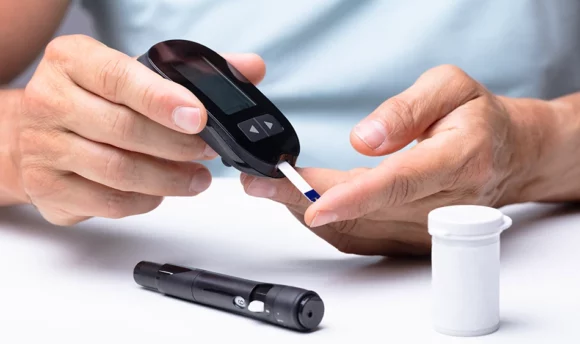Is Keto Good for Diabetes? Explained by a Doctor
Are you planning to start a keto diet but wondering if it’s good for you? Will it help manage diabetes? Or is it safe for you?

The American Diabetes Association (ADA) doesn’t prefer a ketogenic diet over other diets. However, researchers and many experts believe that a keto diet may help with type 1 and type 2 diabetes as well as prediabetes.
If followed correctly and under the guidance of a medical team, the ketogenic diet may help in diabetes management. However, as some individuals are prone to side effects of the diet, it’s best to consult your doctor before deciding to start it.
Let’s understand more about the ketogenic diet and whether it’s suitable for people with diabetes.
Should You Try Keto if You Have Diabetes?
You can follow the keto diet if you have type 1 or type 2 diabetes. However, it would be best to do so under the supervision of a registered dietitian or medical professional.
Oral medicines and insulin lower blood sugar levels. If you restrict carbs, it will lower your blood sugar levels and increase the risk of hypoglycemia – this condition may even result in a diabetic coma.
Besides, the keto diet is effective only if you can maintain the state of nutritional ketosis. This may be difficult for many people due to lifestyle factors such as eating out or traveling for work often.
Following the keto diet needs dedication and time as you have to track macros (protein, fat, and carbs) carefully. Moreover, the keto diet may not be a good option if you have a history of binge eating or disordered eating.
What Is the Keto Diet?
The keto diet involves high-fat, moderate-protein, and low-carb foods. To follow the diet, your goal should be:
- Getting 55–70% of daily calories from fats
- Getting 25–35% of daily calories from protein
- Getting 5–10% of daily calories from carbohydrates
All in all, following the ketogenic diet involves a shift in your dietary habits.
Keto Diet and Diabetes
Your body converts carbohydrates you eat into glucose for energy. If you have diabetes, your body cannot utilize glucose for energy, increasing blood sugar levels.
As the keto diet limits daily carb intake, it aids in managing blood sugar levels, and various studies confirm these benefits.
A 2017 study compared the effect of a keto diet and the “create your plate program” on overweight individuals with diabetes. After 32 weeks, people on the ketogenic diet had lower blood sugar levels and lost more weight.
Another study analyzed the effect of a ketogenic diet and a reduced-calorie diet in obese people with type 2 diabetes. While both groups had improvement in blood sugar control, the keto dieters had better glycemic control.
The keto diet can help lose weight. However, participants in the keto diet group had improved glucose control independent of weight loss.
It’s important to understand here that the information on the long-term effect of the keto diet on diabetes is limited. Besides, the American Diabetes Association (ADA) doesn’t prefer the keto diet over other diets.
Can people with diabetes do keto?
If the keto diet is followed under the supervision of a healthcare professional, it can be of great help in managing diabetes. Scientific studies also have shown that the keto diet improves blood sugar levels.
To manage diabetes, you should focus on lifestyle changes and follow them for the long term. Keep in mind that following the ketogenic diet may be challenging, and other less-restrictive diets might be better for individuals who can’t follow restrictive diets.
Is Keto Good for Type 2 Diabetes?
Yes. A ketogenic diet may help some people with type 2 diabetes.
Insulin is a hormone that helps the body cells utilize glucose for energy. In type 2 diabetes, your body cells do not respond to insulin the way they should. This causes glucose to stay in the blood, resulting in high blood sugar levels.
The lower carbohydrate intake aids in managing blood sugar levels and prevents blood sugar spikes.
Benefits of the keto diet:
- Studies of the keto diet on people with type 2 diabetes have shown it can help control HbA1c (average glucose levels of three months).
- People following the diet may also be able to reduce the need for diabetes medications to control blood sugar levels.
- Obesity is a risk factor for type 2 diabetes. The keto diet helps your body burn excess fat. This aids in losing weight or weight management.
- It improves the sensitivity of body cells to the insulin present in your body.
Ketogenic Diet and Type 1 Diabetes
Following a keto diet with type 1 diabetes may be a bit more complicated than with type 2 diabetes.
In type 1 diabetes, your body doesn’t have enough insulin; therefore, you need external insulin to manage blood sugar levels. As your blood sugar levels decline with a keto diet, you need adjustments in your insulin regimen. It may even result in extremely low blood glucose levels in some individuals.
If you plan to start keto, it would be best to do so under the supervision of a registered dietitian or healthcare professional.
Keto and Prediabetes: Would It Help?
A keto diet may help the prediabetes state by preventing its progression to diabetes.
Prediabetes is a condition where your blood sugar level is higher than normal. However, it’s not high enough to qualify as diabetes. If not managed properly, prediabetes progresses to diabetes. Insulin resistance and obesity are the most common risk factors for prediabetes. These factors prevent the body from utilizing glucose and causing its level to increase in the blood.
A 12-week randomized controlled trial showed that a very low carbohydrate diet effectively improves blood glucose level and insulin sensitivity. Research also shows that a low-carb diet may prevent the progression of prediabetes to type 2 diabetes.
Potential Risks of the Keto Diet for Diabetes
All diets have different effects on your body. Changing diet regimens needs help and monitoring from a healthcare professional or certified diabetes specialist. It’s the best way to prevent the risk of complications or side effects. This especially holds true for pregnant women and people having a medical history, such as high blood pressure.
Some common side effects include diabetic ketoacidosis, an increase in insulin resistance, heart diseases, and nutrient deficiency.
#1 Risk of developing diabetic ketoacidosis
Diabetic ketoacidosis is a complication of diabetes that occurs when the body produces too many ketones.
It happens when the body can’t produce enough insulin. In the absence of insulin, your body cells can’t utilize glucose, a major energy source. Your body starts breaking down fat for energy. This process results in the build-up of ketones in the blood, resulting in diabetic ketoacidosis.
The major risk of following a keto diet is unintentional ketoacidosis. While this is more common in type 1 diabetes, it may occur in people with type 2 diabetes who are experimenting with the keto diet.
Regularly monitor your blood glucose levels and urinary ketones, especially when beginning the diet.
#2 Possible increase in insulin resistance
Researchers believe that the keto diet may interfere with the body’s ability to use insulin properly. This may result in insulin resistance. According to experts, the liver becomes insulin resistant, which is reversible. Once you return to a regular diet, the insulin sensitivity reverts.
However, there is not enough evidence to support this finding yet. On the contrary, a ketogenic diet helps people with type 2 diabetes improve insulin sensitivity. Insulin resistance improves for most individuals when they begin a ketogenic diet.
#3 Risk of heart disease
Keto is a high-fat diet. However, various foods have different fat compositions. Foods rich in polyunsaturated and monounsaturated fats are preferred over those with trans or saturated fats. If you consume more saturated or trans fats, you may be at an increased risk of developing heart diseases.
It is essential to monitor your fat intake while on keto.
Consume food full of healthy fats:
- Avocados
- Nuts and seeds (almonds, walnuts, chia, and flaxseeds)
- Vegetable oils (canola, olive, and sunflower oil)
- Fatty fish (for example, salmon, tuna, and herring)
Avoid food items with unhealthy fats:
- Red meat
- Tropical oils (such as coconut and palm oil)
- Packaged snacks (chips and crackers)
- Commercially-baked pastries, cookies, and donuts
#4 Lack of microelements
Your body needs various minerals and vitamins to maintain its healthy functions. However, many foods rich in these nutrients are considered off-limit in the ketogenic diet. This may result in a deficiency of certain vitamins and minerals.
Make sure you talk to your doctor and supplement these nutrients. It’s best to have a balanced diet with whole grains, fresh fruits and vegetables, lean meats, and whole-wheat bread.
A Word From Our MD
Research shows that the keto diet can help in blood sugar management in the short term. But the evidence for the long term is lacking.
Scientific studies comparing the effect of a keto diet and other low-carb diets have shown that the ketogenic diet is of better help.
However, the effect is best when the diet is followed under the guidance of a medical team. So, if you decide to follow the ketogenic diet, consult your doctor before starting it. This will also help prevent the risk of side effects commonly seen with the diet.
Conclusion
Overall, a ketogenic diet may benefit people with prediabetes and diabetes. Numerous scientific studies have proven its effect on maintaining blood glucose levels, improving insulin sensitivity, and promoting weight loss. All these outcomes are highly beneficial for people with diabetes.
To manage the condition, you should focus on lifestyle changes and follow them for the long term. The ketogenic diet may be challenging, especially for individuals who can’t follow restrictive diets. It also needs the guidance of a medical team to prevent side effects that may come along with the diet, such as hypoglycemia and diabetic ketoacidosis.

















































 Select your language:
Select your language: 








